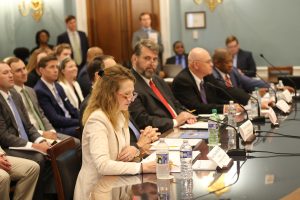From plunging crop prices to rising interest rates and high input costs – not to mention natural disasters – America’s farmers and ranchers are facing a myriad of challenges. New challenges warrant the need for stronger protections, but producers only have an outdated farm safety net to rely on under the current Farm Bill as negotiations remain ongoing over a new bill with no clear end date in sight.
That’s why key agricultural and financial experts appeared last week before the full House Agriculture Committee, using their voices to make it clear to Congress that additional funding and support in the upcoming Farm Bill is not only desirable, it’s absolutely necessary – and well past due.
In a hearing on July 23 focused on the financial conditions in farm country, Dr. Dana Allen-Tully, President of Minnesota Corn Growers Association, gave a powerful testimony, stressing the importance of passing a Farm Bill now. Dr. Allen-Tully pointed to the mounting obstacles that America’s farm and ranch families are facing in growing numbers.
“I don’t want to be discouraging this morning, but it’s important to provide a glimpse at today’s economic picture for agriculture,” she said. “Unless conditions change, we’re facing a perfect storm, though I don’t think it will be fully understood until early next year, when farmers are unable to secure loans because they can’t cash flow.”
In her testimony, Dr. Allen-Tully addressed plummeting crop prices, high costs of production, doubling interest rates, natural disasters, and tightening credit: “Even a new Farm Bill with a strong safety net may not be timely or sufficient, though I pray Congress passes a Farm Bill this year because it will help in the long run.”
Another witness, Mr. David Dunlow, Chairman of American Cotton Producers, summed up the severity of the situation, stating, “Without support in 2024, I may no longer be able to farm. Many others are in the same situation.”
Dr. Dana Allen-Tully, President of Minnesota Corn Growers Association, testifies on the importance of a strong Farm Bill for America’s farm and ranch families.
Additionally, with a growing global population and a dwindling number of farmers and ranchers, it’s critical that strong farm policies support the next generation of producers.
“My family members and I all work on the farm, but we want to make sure our farm continues after us, so we recruited a couple of young, great farmers, beginning farmers, who are working with us,” she said. “We regard them as family, and we hope the Farm Bill will ensure farm families like ours are not penalized.”
Dr. Allen-Tully continued, “If the Senate committee can produce a bipartisan bill very soon with the same safety net provisions, Congress will be well positioned to pass a Farm Bill farmers can count on.”
Dr. Allen-Tully also addressed the economic situation in farm country – which includes a record agricultural trade deficit of $32 billion predicted for fiscal year 2024 – in an opinion piece she penned for Agri-Pulse earlier this month, aptly titled “Rural America doesn’t just want a Farm Bill this year – it needs one.” You can read the full piece here.
Moreover, support for a strong Farm Bill and strengthened farm safety net has been increasing from national leaders and organizations. On July 18, five dozen farm lenders and financial experts sent a letter to House and Senate Agriculture Committee leadership urging Congress to strengthen U.S. sugar policy in the Farm Bill and oppose any efforts to weaken the farm safety net.
Any efforts to undermine the effectiveness of the U.S.’ no-cost sugar policy would “increase the likelihood of farmers defaulting on their operation loans… and generally raise the financial risk associated with sugar production,” the financial experts wrote.
Congressional Members have also expressed support for passing a strong bipartisan Farm Bill, including Congressman Brad Finstad, who represents Minnesota’s First Congressional District and currently serves on the House Agriculture Committee – and is also a fourth-generation farmer himself.
“As we’ve heard today, farm country is facing significant challenges from the weather-related disasters that we’ve seen firsthand in southern Minnesota with the severe flooding that we’ve had, to the compounding effects of increased input costs, interest rates, declining commodity prices, decreased net farm income, and trade deficits,” he said during the July 23 hearing.
“And if we look at some of the very serious things that we’ve talked about in this hearing already and the severe economic challenges that we face in farm country, it’s so important that we get together and we get [the Farm Bill] done,” he later added.
Rep. Brad Finstad (R-MN) shares why it’s critical to pass a strong bipartisan Farm Bill.
“The Farm Bill needs to be done this year. It’s a rural community Farm Bill. It’s not just the farm. There’s different titles that affect all of us that live in the rural United States, and now’s the time before the ball drops coming in the next spring.” – Dr. Dana Allen-Tully, President of Minnesota Corn Growers Association.
Need a Farm Bill refresher? Find a high-level, title-by-title history and overview of this crucial piece of legislation that impacts every American, from the field to the dinner plate here. Plus, learn about agricultural policy straight from America’s heartland on the Groundwork podcast.



